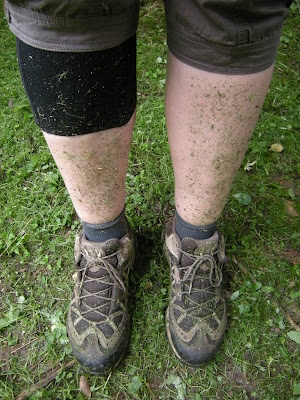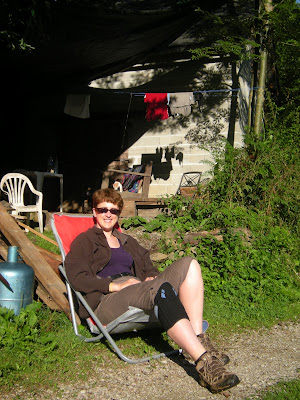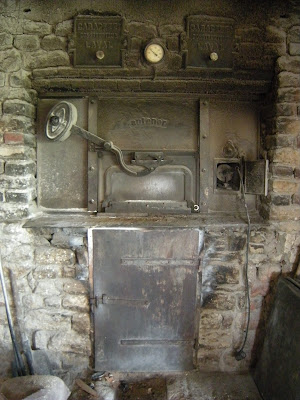Way back in a Paris winter, in the comfort of my apartment, it was a bit hard to read the WWOOFing guidebook and imagine where I might stay this summer, and how the trip might work out. There are over 100 places listed in the book and on the website. But as I read through the listings, I started to form a few principles to help me filter:
- No vegan teetotallers: I am not a big drinker myself, and I don't have to eat a lot of meat, but I found the prissy tone of some listings a bit offputting: "We do not believe in ingesting the toxins found in meat, and if you are rash enough to indulge in the demon drink, may the deity of your choice have mercy on your soul".
- No "musicians welcome" - not only do you have to work, but you have to endure amateur jam sessions afterwards. I gave an especially wide berth to anywhere that mentioned bongos.
- No farms run by single men (for obvious reasons).
- No single women - from fear that they would want endless conversation.
- No "dry toilets", and definitely no yurts - I like my home comforts, and that includes sleeping under a proper roof.
Breakfast at 300km/hr
I took the TGV to Montpellier, a regional train to Toulouse, and then a bus to St Girons, a little town in the Ariege region.
John picked me up from the bus stop. John and Rose moved over from England 30 years ago as they didn't like the way things were going. They were looking for warmer weather, but Portugal was too expensive. They bought some land to grow vegetables, built a house, and raised 5 children with no indoor plumbing.
It was 8pm by the time I got to the farm. I said hello to the other WWOOFer, a young German girl called Julia. We were staying in a concrete building that resembled a tramping hut, with kitchen and living room downstairs, and sleeping quarters downstairs. I had to get out my head torch to supplement the candle power to cook dinner, and I went up the path to check out the bathroom "facilities".
I had left a Paris apartment in the 16th that morning, with a power shower and its own espresso machine. Ooh boy, I don't think we're in Kansas any more Toto! It's fair to say that the first 24 hours were a bit of a shock. But a couple of summers camping up north had stiffened my backbone, and I quickly got used to the basic conditions. I managed to whip up a reasonable frittata with goats cheese and slept like a log.
The first few days it was too damp to work in the garden, so we were put to work chopping wood and strimming the lower garden. Julie had already been WWOOFing in Canada, and even had the flannel shirt to prove it. I made a brave attempt at chopping wood, but quickly bowed to her superior talent and brawn in that department. Work started at 9am and went for 4 hours. In return we got a roof over our heads and all the organic fruit and vegetables we could eat.
After I learn to use a strimmer - results (I)
After I learn to use a strimmer - results (II)
After our work was done for the day, we were left to our own devices. We were at least 5 kilometres up a dirt road from the nearest town or public transport, but it was amazing how fast the days went. After lunch, there were books and papers to read, diaries and postcards to write and hills to explore.
Exploring the valley.
Saturday is market day in St Girons.
Local residents (I)
Local residents (II) - Max the terror (Oh sure, he looks cute now...)
After a couple of days, Klaas, a young Dutch guy turned up. He took one look at the bongos in the corner and said "How glad are you guys that I don't play those!". Klaas proved to be pretty good at the wood-chopping too, so he and Julie were assigned to roll logs down the steep hill to the creek, and haul them up the other side for splitting.
After a few days the weather warmed up and I started on the serious weeding, and that was pretty hard going. I nominated myself as chief cook, so that we didn't have three people in the kitchen at once, and so about 6pm I would get started on pumpkin daal, aubergine curry or whatever I was cooking that night. Julie and Klaas were vegetarian, and with no fridge to keep meat in I was happy to cook without it. Once we ate and the sun set, I was hard-pressed to stay awake.
Once or twice the grown-up children of the family turned up from town in the evenings, bearing bottles of wine and sausages. It was very generous of them, but Klaas being tee-totaller and neither Julie or I drinking very much meant that there wasn't a lot of common ground. I would have been perfectly happy to keep the peace and quiet of the valley intact - but unfortunately they were also keen bongo players and so one night I was treated to a bongo serenade as I tried vainly to get to sleep.
Julia and Klaas lighting a fire.
On the second Saturday, we went in at 5am to set up the stand for the market - and watched the sun rise over St Girons. We had to get in early so as to park the vans down the narrow side streets and set up the tables around them, as later on there would have been no room to move. From the moment we arrived it was all action - quickly unloading the vans before parking them, and then setting up the tables and putting out everything for display. I barely had time to snatch a few photos. We hadn't even finished when the first customers arrived, the old women with their caddies who have been awake for hours. It was only once all the vegetables were laid out for display that someone went to get coffees and I was sent to the bakery for pain au chocolat - called chocolatine in that region. Sitting in the square in the morning light, watching the market come alive around me - six weeks later typing this in Sydney, I can still taste the pastry and the coffee, and feel the energy of the experience flow through me. You know that some moments will just stay with you forever.
For most of the second week, the temperature hit 30 degrees and so we started work a bit earlier. Once we were done, cooling off in the organic swimming pool seemed like the only sensible option, goldfish or no goldfish.
Eventually it was time to leave. It was a fantastic experience and I learnt a lot, but I think I was ready to return to civilisation. After my holiday with Dad there last year, the Pyrenees are one of my favourite regions, and I'm so glad I got to go back.
On the bus back to Toulouse - farewell to my blue hills.
View from the hotel in Carcassonne - civilisation! And a proper shower!
All the photos.




























